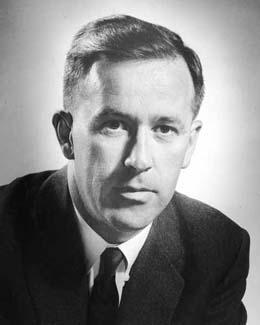On November 4, 1958, Senator Henry M. "Scoop" Jackson (1912-1983) easily defeats Republican challenger William B. Bantz (1918-2000) to win his second term in the U.S. Senate. Six incumbents (five Republicans and a Democrat) are re-elected to the U.S. House of Representatives, and Republican Catherine May (1914-2004) of Yakima wins an open House seat in the Fourth District.
Consistent Campaigner
Jackson was the most consistently successful vote-getter in the state’s history. Following six terms (12 years) in the House of Representatives, he was first elected to the Senate in 1952, and served there until his death in 1983, winning six Senate elections by sizeable margins. A staunch "Cold War liberal," Jackson throughout his career combined unstinting advocacy for increased military spending and a hard line against the Soviet Union with support for civil rights, the labor movement, and increased social welfare programs including national health insurance. For most of his career, and certainly in 1958, these positions commanded widespread support among his constituents, as did Jackson’s personal integrity and clean-cut political image.
Jackson did not take his popularity for granted. He returned frequently from Washington D.C. to visit the state and meet constituents. Although he was not an outstanding public speaker, he was an excellent one-on-one campaigner, with a remarkable ability (assisted by detailed notes) to remember voters' names and important personal information. Jackson and his staff built up numerous political connections throughout the state. And he always campaigned hard and sought substantial victories, perhaps motivated in part by a desire for higher office -- he would later run twice, unsuccessfully, for the Democratic presidential nomination.
Convincing Victories
Therefore Jackson took it seriously, if not personally, when he was challenged in the 1958 Democratic Senate primary by Alice Franklin Bryant, a Seattle peace activist and frequent unsuccessful candidate for various offices. Bryant reflected the views of what was then a small minority of the Democratic party that opposed the military build-up, especially of nuclear weapons, that Jackson strongly supported. Jackson firmly rebuffed the primary challenge, winning all 39 counties with 334,862 votes to Bryant’s 55,200.
In the general election, Jackson faced a weak Republican opponent in "Big Bill" Bantz of Spokane, U.S. Attorney for the Eastern District of Washington from 1953 to 1958. Nevertheless, he took no chances, spending more on his campaign than all but one other incumbent senator. Jackson won more than two thirds of the votes, 67 percent (597,040 votes) to Bantz’s 31 percent (278,271). A convincing landslide, but Jackson would go on to do better -- he won his remaining four Senate elections with between 69 and 82 percent of the vote.
In the House races, Republican Representatives Thomas M. Pelly (1902-1973) in the First District, Jack Westland (1904-1982) in the Second, Russell V. Mack (1891-1960) in the Third, Walt Horan (1898-1966) in the Fifth, and Thor C. Tollefson (1901-1982) in the Sixth were re-elected. In the Third District race, Mack defeated Victor A. Meyers (1898-1991), the former band leader and Lieutenant Governor who was then Secretary of State. Democratic Representative Don Magnuson (1911-1979), who had held an at-large House seat since 1952, was also re-elected, winning the newly created Seventh District. One new member joined Washington’s Congressional delegation. Yakima Republican state legislator Catherine May defeated Frank LeRoux by 54 percent (66,544 votes) to 46 percent (56,308 votes) to win the Fourth District seat in Central Washington that had been held by fellow Republican Hal Holmes (1902-1977).

